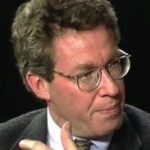--Called for Communists to be tried for treason in the 1950s and pushed for a constitutional amendment to ban flag burning in the 1990s.
Although Salon.com, yet another member of the mighty Clinton propaganda Wurlitzer, recently described Trump as a latter-day Mussolini, it's actually Clinton who is pandering to the Black Shirts. Somehow she has gotten it into her head that the best way to attack Trump is to bash him from the right. Hence her Cincinnati speech lambasting him not for being too extreme on the question of America's foreign policy, but for not being extreme enough.
"American exceptionalism" has become a battle cry because it neatly sums up the imperial ideal of a global hegemon that is so unchallengeable that it supersedes law and morality.
Ironically, none other than Joseph Stalin coined the phrase in 1927 to describe a thesis advanced by U.S. Communist leader Jay Lovestone -- later to become a close collaborator with the CIA -- that American capitalism was so youthful and vigorous as to be exempt from the usual Marxist laws of crisis and decay.
The term went into hibernation following the Crash of 1929 for obvious reasons. But it re-surfaced half a century later among neoconservatives, many of them ex-Marxists who still remembered the old party controversies. But now it was used to describe a country that was not only exempt economically, but morally and politically.
In classic political terms, the U.S. was now the global sovereign, a supreme authority that imposes law on others but not on itself. Whatever the U.S. does is legal because it decides what's legal and what's not. The actions, whatever they are and however they seem to violate legal and ethical boundaries, are moral because the U.S. sets the moral rules.
Bashing the "Anti-Exceptionalists"
Clinton is in love with the phrase because it allows her to draw the line against enemies near and far. On one side are those countries that submit to U.S. sovereignty because they know it is "a force for peace and progress" and thus exist on the good side of the moral-legal boundary, while on the other are those that balk at American control and, as a result, are beyond the pale.

Donald Trump speaking with supporters at a campaign rally at Veterans Memorial Coliseum at the Arizona State Fairgrounds in Phoenix, Arizona. June 18, 2016.
(Image by (Photo by Gage Skidmore)) Details DMCA
Domestically, it allows her to draw a bright red line as well between "patriotic" Americans who embrace the doctrine and a few naysayers who don't.
Among the latter, remarkably enough, is Trump. At a Texas Tea Party event in April 2015, Trump confessed that he didn't "like the term." As he put it:
"People say, 'Oh, he's not patriotic.' Look, if I'm a Russian, or I'm a German, or I'm a person we do business with, why, you know, I don't think it's a very nice term. We're exceptional; you're not. First of all, Germany is eating our lunch. So they say, 'Why are you exceptional? We're doing better than you.' I never liked the term. And that's because I don't have a very big ego and I don't need terms like that. Honestly."
For Clinton, this is pure heresy. Since "defending American exceptionalism should always be above politics," as she put it in Cincinnati, Trump is plainly at odds with the new U.S. consensus.
Since another person who rejects American exceptionalism is Russian President Vladimir Putin -- "It is extremely dangerous to encourage people to see themselves as exceptional, whatever the motivation," he declared in 2013 -- the two men must somehow be in league.
None of this is to let Trump off the hook. His neo-isolationism is hardly less pugnacious than Clinton's interventionism since it sees the world as ganging up on the U.S. in order to rob its wealth and weaken its economy.
As he also told the Texas Tea Party gathering: "I want to take everything back from the world that we've given them. We've given them so much."
(Note: You can view every article as one long page if you sign up as an Advocate Member, or higher).





